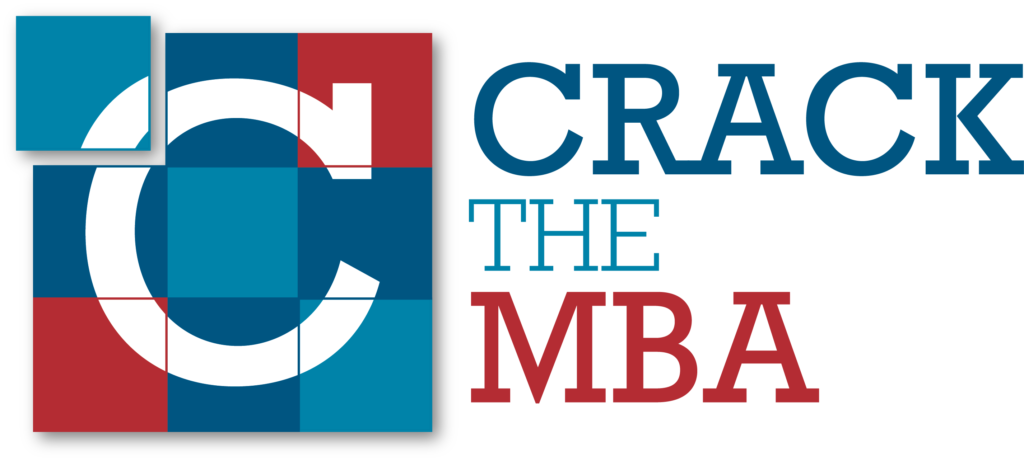Today, we take the opportunity to feature two entrepreneurs who are part of the Class of 2011 MBA graduates from The Wharton School who applied learnings from an Innovation class they studied at Wharton to launch their company at school. Their story is a great example of “East Meets West”. Together, this duo has launched “Bandar Foods” which “re-imagines traditional India condiments for the everyday American Foods”. One could liken their ‘monkey sauce’ to Sriracha (of Thai chili sauce fame) for Indian food.
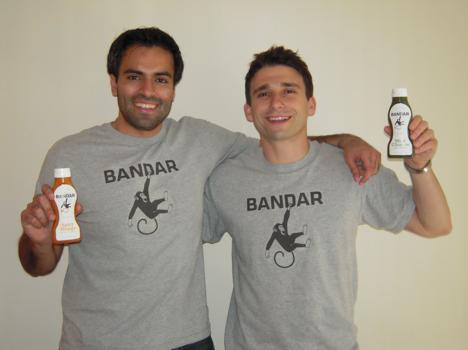
Co-Founders, Dan & Lalit
Dan Garblik
Dan has an undergraduate degree from Cornell’s School of Hotel Management. Subsequently, he worked as a restaurant manager for Harrah’s on the Las Vegas strip. Currently, in addition to heading the marketing and branding efforts at Bandar Foods, Dan works with a tech startup focusing on business development.
Lalit Kalani
Lalit has an undergraduate degree from NYU’s Stern School of Business. After graduating, Lalit moved back to India with starry-eyed dreams of becoming an actor in Bollywood. However, family responsibility made him push those dreams to the background and he moved lock, stock, barrel into his family business’ alcohol manufacturing facility in a remote area of Maharashtra. Lalit set out to turn around the struggling family business. He stayed in this setup for 3 years and his efforts culminated in the eventual turning around of the business. Currently, Lalit leads all operations-related aspects such as logistics, manufacturing, supply chain management, shipping and customs at Bandar Foods while working as a management consultant on the East Coast.
Below, you can read the exclusive interview coverage by “Crack The MBA” of Lalit Kalani, Co-Founder of Bandar Foods.
How did the idea for starting Bandar Foods come about?
Dan loves spicy food and after moving to Philadelphia to attend Wharton he had a sudden urge to eat spicy food. So he thought, “What better cuisine than Indian food for the same”. On tasting the food, Dan decided he wanted to make it spicier and asked for some hot sauce. The restaurant staff gave him a confused look and got him some Tabasco. Dan was surprised and thought to himself –
“Did Indians not have their own hot sauce”. That was how the seed for creating a spicy sauce with flavors from Indian food was first sown. Dan spoke to Lalit about his experience and together, the two went to an Indian store filled with aisles of pickles and chutneys, popular Indian condiments. The two bought everything they could lay their hands on and liked a few. This was the ‘aha’ moment where they had an epiphany about creating a sauce with flavors of spicy mango and mint cilantro that could be enjoyed with sandwiches, falafels, hot dogs and more…
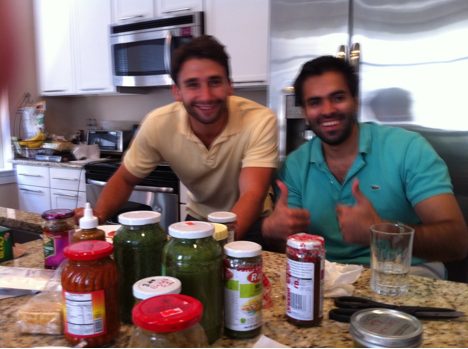
Experiencing ‘Chutneys’ & ‘Achars’
How did you take the business from ideation to creation?
In the second year of their MBA program at Wharton, Dan & Lalit took a course called “Innovation Problem Solving & Design” which was taught by Professor Karl Ulrich. The class is structured so that everyone goes into the class with 10 ideas. Every week, half the ideas are voted down and people who are voted out, join the teams of the ideas that are voted in. Dan & Lalit went into the class with their idea for Bandar Foods and their idea kept getting voted in and their team kept getting bigger and bigger. This further validated their idea and moreover, they were able to leverage a great support network and by the end of the class, they had come up with a prototype for their idea – “originally known as Balu Bandar”. Lalit & Dan experimented for weeks and came up with the recipe based on multiple iterations and feedback from classmates. Lalit bought plastic bottles off the Internet, they bottled the sauces in Dan’s kitchen and came up with a good prototype that was well-received by the class. They served their prototype with American crackers and ended up winning the tournament. As a result of this effort, Dan & Lalit got the impetus needed to go ahead and manufacture the sauce on a larger scale. Being Wharton grads, they did crunch numbers and decided to manufacture the sauce in Maharashtra, India. Their efforts have finally culminated into Bandar Sauces going live for sale this summer after all necessary FDA approvals.
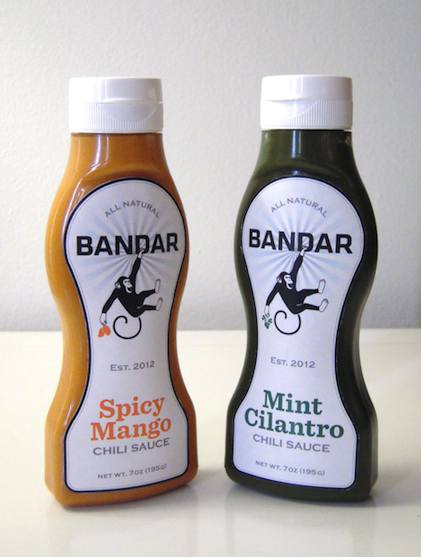
Spicy Mango & Mint Cilantro Sauces
How did entrepreneurship happen for you? Was it something you had planned to do even before school?
Even though Dan & Lalit had not necessarily conceived of Bandar Foods specifically before coming to Wharton, entrepreneurship has happened for them as a result of a conscious choice.
Prior to business school, Dan was involved in a few entrepreneurial ventures pertaining to crowd funding – the Kickstarter model for non-profits. He also started with online tutoring when it was very new – as a teenager, within his community
Lalit’s family has always been entrepreneurial. His dad and grandfather got into business in 1984. He has always had an entrepreneurial streak in him and entrepreneurship pretty much runs in his blood.
What’s the perception you see on campus with regard to entrepreneurs and entrepreneurship?
The whole aura for working for a corporate is diminishing; everyone’s like “I have an idea and I want to meet someone who is doing something. Everyone wants start a business”
How did you two go about splitting roles and responsibilities?
It so worked out that the two complement each other rather well. Lalit has a natural interest and competence in operations and Dan has an interest in marketing and branding. Therefore, roles and responsibilities have naturally fallen into place for the two. But working for a start up you have to be prepared to do anything and everything that your fledgling business requires – whether that means burning out your tongue because you had to taste whether the sauce needs 1 of 5 chilies.
Based on your experiences, what advice would you have for young entrepreneurs looking for partners or about to enter into a partnership?
More than the idea, the right partner is important. At the end of the day you need to be able to execute. There is no dearth of idea and you don’t necessarily need to create something new. It’s all about execution. Look for someone that has the competency that will complement yours. You should ask yourself if you can sit in a room with someone for hours on end and more importantly you need to have confidence in your partner. Lalit & Dan have extremely complementary skills which makes them ideal partners.
What’s your view on equity – should it be evenly split or should it be tied to each person’s roles and responsibilities?
Lalit & Dan had the equity conversation very early on and decided to go 50/50 as both of them decided to put in everything equally – be it work, money, time. Having said that, Lalit can see value in equity being split up disproportionately if one has a larger team wherein the level of involvement might vary by team member. Have the equity conversation early and lay down the ground rules – this might be uncomfortable upfront, but you rather have this conversation in case things start going wrong.
How much equity do you think young startups should set aside for future employees, etc.
Just get started. When you need to take on someone, figure out how much equity you need to shell out then. You can allocate 5%, 10% or X%. Lalit does not know what the right number is. Even if you don’t set aside equity, you can always do it later on.
What funding options did you consider?
They haven’t spent a lot of money or invested too much. They have been very cost conscious from day one and not thought about funding at this stage. Running a very lean operation they decided to fund the business themselves. The thinking was “let’s get the first two batches and then take it from there”.
One thing they learnt from their class is that as a startup business, one should try to launch as cheaply and lean as possible avoid making and thinking of big investments upfront. They have really followed this model to the tee. Their investment is very minimal.
Now that they are trying to get bigger, they have Kickstarter and also have full-time jobs which help with funding Bandar Foods. They are not as ready to give up as much equity, yet. Maybe when one of them is ready to go full-time, they will look into raising some money to pay a nominal salary to cover living expenses.
What made you decide to raise money through Kickstarter? Why?
Kickstarter is a great way to not only raise funds, but also to do so in a socially engaging way. For Bandar Foods, it has been a great way to build buzz due to which they are now featured bloggers on Huffington Post. Moreover, one of the largest food distributors in the country got in touch with them wanting to take on their products. They have also seen interest from the other side of the world – Australia. All this has been made possible due to the buzz been created from the Kickstarter campaign. Furthermore, as part of Kickstarter, one does not have to give up equity which is great for an early stage startup. Family and friends can contribute towards your fundraising efforts and there’s a dashboard that tells you the source of the funding. In their case they were pleasantly surprised to see 60% of the money coming in through sources other than family and friends, which helped demonstrate interest in their product, Kickstarter is helping them bring in their first batch. They set a goal of raising $5,000 and by the end of it they raised over 5 times that amount with over 1000 backers!
How has Wharton played a role? (Resources, Network, Brand)
Wharton has been a real game changer for the two of them. Not only have they benefited from the classes, resources, faculty, peers but it has also opened doors for them funding-wise. Lalit highly recommends starting a business during school as it’s a totally risk-free proposition. One has nothing to lose and if one fails, one still has the option of getting a job.
The classes at school have really helped the two. The entrepreneurship classes have helped them in formulating themes and the marketing classes have helped teach how to create social media buzz. At the end of the day, business school is really what you make of it. There’s an endless pool of resources to tap into. At Wharton alone, Dan & Lalit took part in the Wharton Entrepreneurial Programs and Venture Initiation Program. Both took a course on Legal Aspects of Entrepreneurship that taught them a lot of practical things about starting a business.
Then you have this huge network of peers and everyone is willing to help you. For anything that the two needed, someone would be like “I know this guy who could help you out”. You can also meet your future partners and teammates at school. Finally, business school also provided them a test market wherein they could refine their product by getting feedback from the student community at Penn.
Bandar Foods is a name that really stands out and makes one sit up and take notice. How did you end up naming the company “Bandar Foods”? Was it named this way to pique the interest of stakeholders?
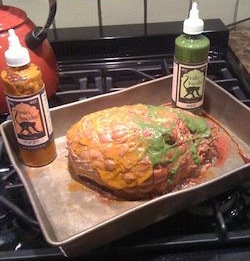
Monkey Sauce on Thanksgiving Turkey
Dan & Lalit took a marketing course that talked about how creating social media buzz and how to make things stick in the minds of consumers. One of the slides stated that products with animals have great brand recall. This just stuck in both their minds. The night before the two had to submit their idea for the Innovation class (mentioned above), Lalit asked Dan what his favorite animal is. Dan said it was a monkey and they decided to name the company “Bandar Foods”. While at school, they handed out bottles of their sauce to people and actually saw the learning from their class in action – they were starting to be known as the “monkey sauce” guys. People would try out their sauces on everything from a Thanksgiving turkey to McNuggets and Fries and email them pictures telling them how good the sauces tasted!

Monkey Sauce with Mc Nuggets & Fries
Can you talk a bit about your marketing and distribution strategy?
Social media is the only medium of marketing for them at the moment – it is free given the lean operating model, it works Facebook has been an important driver for them during their Kickstarter Campaign
In terms of distribution, they have pitched to some major retailers such as Whole Foods through which they have also connected with to distributors. Retail stores and distributors go hand in hand as one will not work with you unless you have the buy-in from the other.
In addition, they plan to sell through their own website and other online grocery markets such as Amazon.com and Abes.com. In future, they will look at other forms of distribution such as partnering with cafeterias of large corporations, food carts, restaurants etc.
In terms of geographical focus, what are the markets you would look to focus on in the short-term and long-term?
Bandar Foods is focusing on the U.S. market first. They can scale up to supply in any country, but maintaining focus is important. After the U.S., the likely markets would be Canada and U.K. In fact, they have seen interest from other countries and are looking to explore these options if they can get the right partners.
What has the experience of bringing your products to market been like?
Lalit is of the view that making something is easy; selling it is the hard part. Although making this was not as easy as he thought, they were lucky to find a manufacturer who was more like a partner. There were interesting challenges along the way such as figuring out how to bottle the product, getting FDA approvals and working with import and custom brokers
In the U.S., Lalit & Dan started blending different ‘chutneys’ and ‘achars’. Lalit’s mom makes a lot of ‘achars’ and ‘chutneys’ at home and the recipes have been inspired by her. They worked with the manufacturers to convert this homemade recipe to scalable one without losing the original flavors and tastes.
In the future, are there plans to expand the product line? What interesting condiments do you have in the pipeline?
Yes, additional products are in the pipeline. Dan & Lalit are working on spicy ketchup, and Indian Chilly Garlic to name a few.
Is there any other advice that you have for prospective MBA students, current students and/or future entrepreneurs?
“Your MBA is what you want to make out of it. Goals change and that’s bound to open but go into your MBA knowing what you want to get out of it. It’s also the best time to take risks. You will still get your job after school – if that is what you want but you won’t get the risk-free opportunity of starting a business after school. There are tons of resources for you to take advantage of. When you get there, try and find out what resources are available so that you don’t miss out on anything.”
